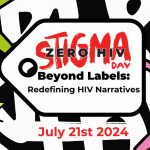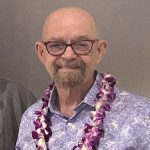What’s the most helpful thing anyone has said to you over your years living with HIV?
“I’ll be there if/when you need me. I love you.”
What change or development in your treatment for HIV has most affected your life—for better or worse?
For worse: my ability to earn a living. After 26 years of living with HIV/AIDS, I feel as if the world has passed me by somewhat, and as I age and have my virus under control for the most part, my choices for earning have diminished.
I realize this probably isn’t the answer you’re looking for. Perhaps I might better say that the improvement of HIV medicines, especially the advent of protease inhibitors in the 1990s, was a big turning point in my health. So has been the knowledge and understanding that I must remain adherent to my prescribed regimen.
What is your refuge from thinking about and dealing with your health?
My true refuge has been my family. When I learned I was infected, my children were in preschool and kindergarten, and I was determined to make sure I was around to raise them. They have given me great joy over the years: I was able to see both sons graduate from high school and one become a father. And I witnessed the birth of my first grandchild and was there for the birth of the next two! I also saw my other son graduate from college with a bachelor of fine arts.
My favorite artist is my son, Nicholas Adams. I don’t have any other passions that serve as a refuge.
What has been your major economic challenge since testing positive?
Keeping above my incoming bills has been a huge challenge. I constantly have to juggle my finances to even stay afloat. After 15 years with a long-term disability policy supplementing my SSDI, they determined that I was well enough to return to work in my former occupation on a full-time basis. Fatigue, the economy, lack of jobs and the dissolution of the company I left to go on disability have proved the insurance company wrong. I haven’t given up the fight, but the energy it takes to try to right that wrong is a mental and sometimes physical downer.
What one thing has most aided your survival, and how difficult is it to overcome stigma?
Stigma has never really been an issue for me. I feel that if someone wants it to be, it is so. The one thing that’s aided my survival is me—my drive and plans to see my children raised to a point where they’re responsible adults and can care for themselves. That was the first thing I thought of when I was diagnosed with HIV—that I had to be the one to see them through to an age where they can be independent. Of course, friends and coworkers (I work part-time at an AIDS service organization) have been wonderful too.
One other thing that comforts me is my [deceased] husband. His cremains are in a marble urn that is very huggable. When I pass away, I will be cremated, too, and his and my ashes will be mixed together in one big urn. I really miss him so, but I know he’s near me all the time.
Do you think there will be a cure in your lifetime—and if so, will you benefit from it?
This is a rough one. I’m aware of the patient in Berlin who has been judged cured [through a stem cell transplant], which certainly helps research make great strides. Will I ever benefit from a cure? I don’t know. I have been living with HIV/AIDS for more than half my life, and although it sounds morose, I feel that I will die with it. Research has come a long way, as have treatment, advocacy and even social acceptance to some point. If there’s a cure, I don’t know whether I’ll be happy or angry, elated or depressed because it didn’t happen when I was younger or when my husband was still alive. If I’m cured, it’s going to be in my golden years. I’ve come to accept that. I would really love to see my grandchildren grow up, and a cure would certainly be a step in the right direction to do that.
What advice would you give to someone newly diagnosed?
Don’t let this virus get you down. The mind is a powerful tool in keeping you healthy and vital. Someone newly diagnosed goes through so many emotional stages and it takes a while for it to sink in. But find something in your life or future to work for. If you take medication, do your best to stay adherent so your virus doesn’t go all wild on you. Tell who you want to know and keep it private from those you don’t want to know.
Your virus belongs to you—don’t spread it to anyone else. Use safer-sex techniques. Learn about HIV/AIDS, but don’t dwell on the virus. Live, and find the beauty in everything around you. Let go of anger and rage. If you have rage, make sure it’s in the right direction: Learn to be an advocate for your own health and demand whatever it takes. Make sure you have a good support system, such as family, friends, support groups, therapy—whatever it takes. Don’t sweat the small stuff.
This all sounds so clichéd, but it works for me.


Tracy Bruce Courtesy of Tracy Bruce
Tracy Bruce
Georgia peach of a mom and grandmother, HIV prevention specialist, positive for 26 years






Comments
Comments